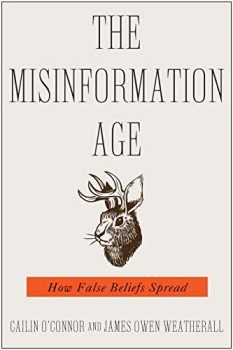Cailin O’Connor and James Owen Weatherall in Imperfect Cognitions:
 Since early 2016, in the lead-up to the U.S. presidential election and the Brexit vote in the UK, there has been a growing appreciation of the role that misinformation and false beliefs have come to play in major political decisions in Western democracies. (What we have in minds are beliefs such as that vaccines cause autism, that anthropogenic climate change is not real, that the UK pays exorbitant fees to the EU that could be readily redirected to domestic programs, or that genetically modified foods are generally harmful.)
Since early 2016, in the lead-up to the U.S. presidential election and the Brexit vote in the UK, there has been a growing appreciation of the role that misinformation and false beliefs have come to play in major political decisions in Western democracies. (What we have in minds are beliefs such as that vaccines cause autism, that anthropogenic climate change is not real, that the UK pays exorbitant fees to the EU that could be readily redirected to domestic programs, or that genetically modified foods are generally harmful.)
One common line of thought on these events is that reasoning biases are the primary explanation for the spread of misinformation and false belief. To give an example, many have pointed out that confirmation bias – the tendency to take up evidence supporting our current beliefs, and ignore evidence disconfirming them – plays an important role in protecting false beliefs from disconfirmation.
In our recent book, The Misinformation Age: How False Beliefs Spread, we focus on another explanation of the persistence and spread of false belief that we think is as important as individual reasoning biases, or even more so. In particular, we look at the role social connections play in the spread of falsehood. In doing so we draw on work, by ourselves and others, in formal social epistemology. This field typically uses mathematical models of human interaction to study questions such as: how do groups of scientists reach consensus? What role does social structure play in the spread of theories? How can industry influence public beliefs about science?
More here.
